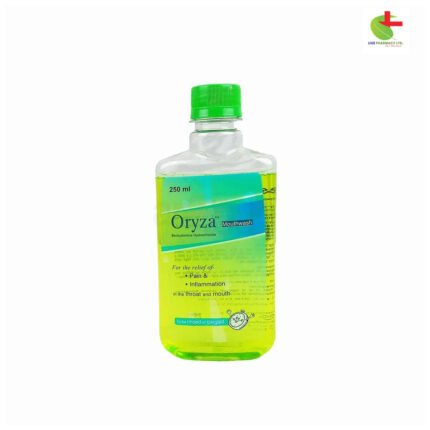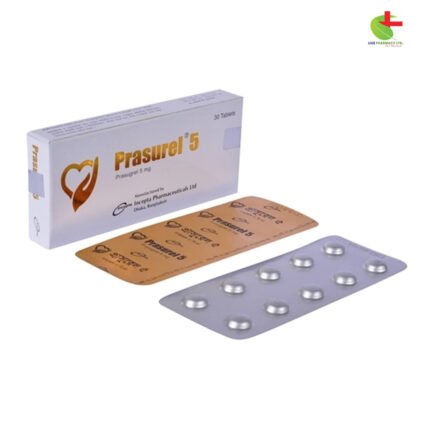Barbit 60
15.00৳ Strip
- Barbit is a barbiturate used as a sedative-hypnotic and anticonvulsant, effective for short-term insomnia and the management of seizures.
- It acts on GABAA receptors to enhance inhibitory signaling in the central nervous system.
- Barbit is indicated for conditions such as status epilepticus and pre-anesthetic sedation.
- Always consult a registered physician before use to ensure safety and proper dosage.
 Brand
Brand
|
Incepta Pharmaceuticals Ltd |
|---|---|
 Generics
Generics
|
Phenobarbital |
 Type
Type
|
Tablet |
Indications
Barbit is indicated for:
- Sedation and short-term treatment of insomnia
- Pre-anesthetic use
- Long-term management of generalized tonic-clonic and cortical local seizures
- Emergency control of acute convulsive episodes, such as status epilepticus, eclampsia, meningitis, tetanus, and toxic reactions to strychnine or local anesthetics.
Registered physician’s advice should be followed when using this medication.
Description
Barbit is a barbiturate that acts as a nonselective central nervous system depressant. It is primarily utilized as a sedative-hypnotic and also serves as an anticonvulsant at subhypnotic doses.
Pharmacology
Phenobarbital, the longest-acting barbiturate, is effective for its anticonvulsant and sedative-hypnotic effects in managing various seizure disorders, excluding absence seizures. It enhances GABAA receptor activity, thereby increasing synaptic inhibition, elevating seizure thresholds, and minimizing the spread of seizure activity. Additionally, it may inhibit calcium channels, leading to reduced excitatory neurotransmitter release. Its sedative effects are likely due to its influence on the midbrain reticular formation, which regulates CNS arousal.
Dosage & Administration
Pediatric Oral Dosage:
- Preoperative: 1 mg to 3 mg/kg
- Anticonvulsant: 1 mg to 6 mg/kg per day
Adult Oral Dosage:
- Daytime sedative: 30 mg to 120 mg daily in 2-3 divided doses
- Bedtime hypnotic: 100 mg to 320 mg
- Anticonvulsant: 50 mg to 100 mg 2-3 times daily
Pediatric Injection Dosage:
- 15 to 20 mg/kg IV over 10-15 minutes
- Preoperative Sedation: 1 to 3 mg/kg IM/IV
- Anticonvulsant: 4 to 6 mg/kg IM/IV per day for 10 days, or 10 to 15 mg/kg IM/IV per day for faster therapeutic levels. Maximum IV rate: 60 mg/min
Adult Injection Dosage:
- Insomnia: 100 to 320 mg IM/IV
- Convulsions: 100 to 320 mg IV, repeat if necessary (maximum: 600 mg per day)
- Status Epilepticus: 10 to 20 mg/kg IV, repeat if necessary
Registered physician’s advice should be followed when using this medication.
Interaction
Co-administration with alcohol or other CNS depressants may enhance CNS depressant effects.
Contraindications
Phenobarbital is contraindicated in patients with known hypersensitivity to Phenobarbital or a history of latent porphyria.
Side Effects
Common side effects include somnolence, agitation, confusion, and CNS depression. Less frequent effects may include nightmares, hallucinations, and gastrointestinal disturbances.
Pregnancy & Lactation
Pregnancy Category D. Phenobarbital may cause fetal harm. Caution is advised for nursing mothers, as small amounts can be excreted in breast milk.
Precautions & Warnings
Long-term use may lead to tolerance and dependency. Use cautiously in patients with mental health issues, hepatic impairment, or a history of substance abuse.
Overdose Effects
Toxic doses of barbiturates can vary significantly. An oral dose of 1 gram may cause serious poisoning in adults, while death can occur from 2 to 10 grams. Overdose leads to CNS and respiratory depression, requiring immediate hospitalization for supportive care.
Therapeutic Class
- Adjunct anti-epileptic drugs
- Barbiturates
Storage Conditions
Store below 30°C, away from light and moisture. Keep out of reach of children.













Reviews
There are no reviews yet.